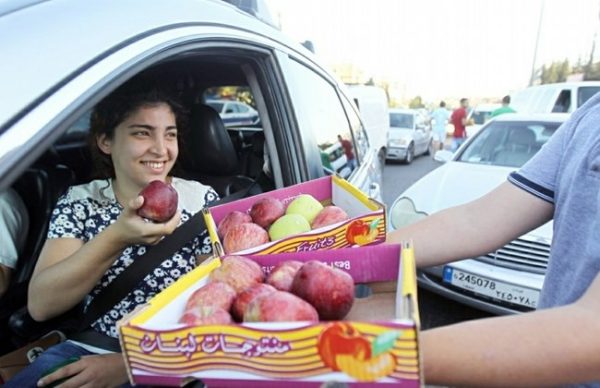
Lebanon recorded sharp drops in apple exports in 2016, as farmers suffered from political decisions that closed various markets that, in turn, led to substantial drops in prices.
Apple farmers held dozens of protests and blocked roads across Lebanon to urge government action, asking authorities to compensate them . Small producers already sold most of the 155,000 tonnes of apples produced during this season at the very low price of LL250 (17 cents ) per kilogram . Worse, some of the leading merchants who purchased the locally produced apples imported apples from Turkey, to further deflate prices.
This was an unsettling situation that was directly linked to poor political decisions at the expense of hard-working farmers. For beyond meeting local market needs, Lebanese agriculture production shifted towards lucrative exports, which flourished between 2007 and 2014. In fact, exports of potatoes, citrus, apples, bananas, onions, lettuce, grapes, and apricots, in particular, recorded net increases averaging 4 per cent each year, passing from 504,000 tonnes in 2011 to 526,000 tonnes in 2014. Moreover, and despite higher production costs, Lebanese farmers survived, though import restrictions from Gulf Cooperation Council states closed various trade routes. Traditional markets like Saudi Arabia, Kuwait and the UAE were no longer willing to conduct business with Lebanon because of Hezbollah’s interference in their internal affairs.
On Tuesday, Agriculture Minister Akram Chehayeb revealed that Prime Minister Tammam Salam reached an agreement with Egyptian President Abdul Fattah Al Sissi during a meeting held on the sidelines of the United Nations General Assembly in New York, to increase Egyptian imports of Lebanese apples. As Cairo imports up to 38,000 tonnes of Lebanese apples a year, and has been doing so since 2008, this new deal will see the figure reach 50,000 tonnes, or a third of all local production. Chehayeb announced that Lebanon would cover transporting costs while Egypt will be responsible for refrigeration.
But the deal was too little , too late for the poor farmers who could not afford to wait and had to sell their product at dirt cheap prices to greedy merchants.
According to Antoine Howayek, head of the Lebanese Farmers’ Association, “Farmers would have sold their produce at LL600 per kilogram to Egypt instead of LL250,” adding, “those who will really benefit from this move, if approved, are big farmers and merchants.”
Chehayeb further revealed that agreements to export Lebanese apples to Jordan and Russia were under negotiation, with the former ready to accept fresh batches on October 18 instead of the end of the month, and Moscow considering a reduction of import taxes from $250 to $66 per tonne on Lebanese apples.
Why senior government officials waited until this late in the season to work on various remedial measures was a mystery. Earlier actions would have benefitted farmers far more.
Frustrated by Lebanon’s recurring apple crises, farmers vented their anger on television news programmes, and promised to replace fruit trees with cannabis (hashish).
With GN

Leave a Reply
You must be logged in to post a comment.